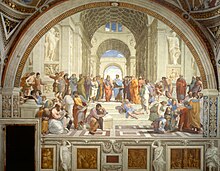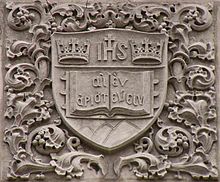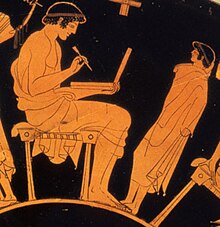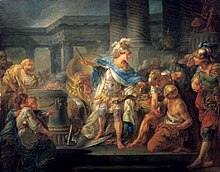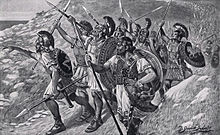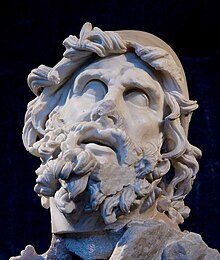List of Classical Greek phrases
A hoplite could not escape the field of battle unless he tossed away the heavy and cumbersome shield.
Therefore, "losing one's shield" meant desertion.
(Plutarch, Moralia, 241) ψυχῆς ἰατρεῖον
Ἀεὶ κολοιὸς παρὰ κολοιῷ ἱζάνει
jackdaw
is always found near a jackdaw"
Papyrus, dated 75–125 A.D. describing one of the oldest diagrams of
Euclid's Elements
ἄριστον μὲν ὕδωρ
; Pump Room at
Bath
From a ca 500 BC vase depicting writing with stylus and folding wax tablet
ΔΙΠΛΟΥΝ ΟΡΩΣΙΝ ΟΙ ΜΑΘΟΝΤΕΣ ΓΡΑΜΜΑΤΑ
Eagle carrying a snake in its talons
370 BC copy of marble statue of
Plato
Maniot
flag:
Νίκη ἢ Θάνατος
—
ἢ τὰν ἢ ἐπὶ τᾶς
"Victory or Death : Either With Your Shield or On It"
Θάλαττα, θάλαττα
— "The Sea! The Sea!" — painting by Granville Baker; from a 1901 issue of LIFE magazine
ΙΧΘΥΣ:
Ἰησοῦς Χριστὸς Θεοῦ Υἱὸς Σωτήρ
Painting of Pheidippides as he gave word of the Greek victory over
Persia
at the
Battle of Marathon
to the people of Athens, by
Luc-Olivier Merson, 1869
οἶνοψ πόντος
—
wine dark sea
Charon's obol
. 5th-1st century BC. All of these pseudo-coins have no sign of attachment, are too thin for normal use, and are often found in burial sites.
Rosy-fingered Dawn
Aristarchus's
third century BC calculations on the relative sizes of the Earth, Sun, and Moon, from a tenth-century CE Greek copy
The Phoenician alphabet as used on the
Mesha Stele
(the Moabite Stone)
The Ancient Library of Alexandria
Epitaph at the Thermopylae
